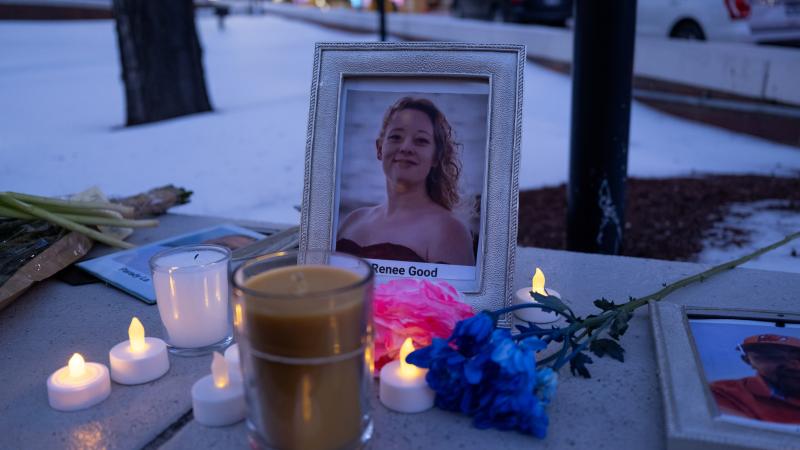Canceling Columbus: How it started years ago, and escalated in 2020
Much of the hostility toward Christopher Columbus can be traced back to Howard Zinn's popular book of polemical history, "A People's History of the United States."
Attacks against statues of Christopher Columbus and calls to replace Columbus Day with Indigenous People's Day have become a Columbus Day ritual in recent years. This year they began early, shortly after the May 25 death of George Floyd while in the custody of Minneapolis police, as protests against police and "systemic" racism quickly turned into riots.
This year's riots differed from others, such as Watts in 1965 and Ferguson in 2014. This summer's destruction rippled outward beyond the communities where the alleged police brutality took place. Symbolic vengeance for what was seen as the murder of a black man by white police officers was exacted in the widening desecration, destruction and removal of public historical monuments: first, statues of Confederates, then Columbus and, finally, an increasingly indiscriminate sweep of figures from American history, including even abolitionists, black Union soldiers, and the commander of the Union Army, Ulysses S. Grant.
Much of the hostility toward Columbus can be traced back to Howard Zinn's popular book of polemical history, "A People's History of the United States," in continuous publication since 1980. The claims in this book are now widely accepted as conventional wisdom. Wikipedia, for example, attributes this summer's wave of attacks on and removal of more than 30 Columbus statues to the explorer's "enslavement of and systemic violence against the indigenous people of the Caribbean, including the genocide of the Taino people."
"A People's History" is used increasingly as a core history textbook in schools. The Zinn Education Project offers lessons based on Zinn's book, as well as "Abolish Columbus Day" kits. Zinn, ten years after his death, remains an icon of the political left and a profound influence in shaping unwary students' understanding of our national history.
What happened in New Haven, Conn., this summer provides a case study. A statue of Columbus had stood in the city's Wooster Square Park since 1892. But on June 24, 2020, the statue, defaced with red paint, was taken down by workers, as fights erupted between supporters and opponents of the removal.
Randall Beach, New Haven Register columnist, used Zinn's book to advocate for the statue's removal in a June 25 column headlined "With the Columbus statue gone, let the healing begin." Beach described the fights as occurring between Black Lives Matter members and opponents. One man told Beach he wanted the statue to stay because Columbus was not "a murderer and a rapist." This unnamed man echoed letter-writer Frank Mongillo, III, who objected to the removal of the statue, which had been funded by donations from "a group of Italian societies" and which, he said, symbolized pride and helped "build a sense of connection between the Italian community and America's history."
Beach wrote that he had asked the man in the park "if he had read the historian Howard Zinn and his 'People's History of the United States' ... Zinn used Columbus' journal and the observations of a writer-priest to amass extensive evidence that Columbus committed atrocities. ..."
Beach was repeating claims from his June 18 column, which relied on the famous opening pages of Zinn's book, which, as demonstrated in my own "Debunking Howard Zinn," Zinn actually plagiarized from a book for high school students by his fellow anti-Vietnam War organizer, Hans Koning, a novelist.
Zinn also quoted deceptively from Columbus' journal. One of these deceptive quotations cited by Beach formed the basis for a scene in "The Sopranos." The teenage A.J., doing homework, reads from Zinn's book: "They would make fine servants. ... With fifty men we could subjugate them and make them do whatever we want." The passage, A.J. says, is proof that Columbus was a "slave trader."
Television viewers did not see the ellipses, and they should not have needed to, for ellipses are used to eliminate short, nonessential passages. Zinn's, however, leave out pages — two days' worth of the explorer's log entries, including such sentences about the native inhabitants he encountered as: "I know that they are a people who can be made free and converted to our Holy Faith more by love than by force."
Zinn also failed to indicate that it was a hostile tribe — not Columbus — that thought "they" would make "fine servants."
Beach also cited Zinn's quotations from the Spanish priest, Bartolomé de Las Casas, who, regretting that he had previously owned Indian slaves, wrote polemics against their enslavement. His accusations against the Spanish colonizers were grossly exaggerated, as translator Andree Collard makes clear in the introduction to her 1971 translation of Las Casas' "History of the Indies." Though Zinn included this book in his bibliography and quoted from it, he did not note the translator's warnings. Nor did Zinn acknowledge that Las Casas praised Columbus.
In his July 8 column, Beach responded to "critics... [who] cannot be persuaded ... that Columbus committed ghastly acts after he 'discovered America.'" He presented even more "evidence" — a book that he claimed "goes into far more detail than Zinn did about ... Columbus." The book? Koning's "Columbus: His Enterprise: Exploding the Myth" — the book Zinn plagiarized in the opening pages of "A People's History."
Zinn has been roundly criticized by conservatives for a falsified history that has inspired hatred for America. But historians on the left have also long attacked his scholarship. For example, Georgetown history professor Michael Kazin — a Democratic Socialist — called Zinn's book conspiratorial "bad history." The late historian Eugene Genovese, who knew Zinn, dismissed "A People's History" as "left-wing sloganizing." At the time, both Genovese and Zinn were Marxists.
Liberal historian David Greenberg recounted in The New Republic the debate between leftist historians in the late 1960s, with Genovese hoping for a "socialist future," but calling for remaining "true to the evidence." Zinn, on the other hand, distorted the evidence in service to a radical-left activist agenda.
Although Zinn always denied having been a Communist Party member, historians have disputed his claim. Cold War historian Ronald Radosh, himself a former Party member, concluded on the basis of Zinn's 423-page FBI file that "Zinn was an active member of the Communist party (CPUSA)."
To be sure, Columbus was not perfect. Most scholars acknowledge that Columbus often failed to manage his men. Though he repeatedly instructed them to treat the natives with kindness, some did abuse and cheat the natives. One of these Columbus had hanged.
Columbus' talents lay elsewhere, in seamanship. A devout Catholic, he hoped to set up a trading post with the Grand Khan of China in order to finance a crusade to take back Jerusalem from the Muslims. One of the natives Columbus had baptized became his godson.
This information comes from the scholarship of Carol Delaney, Stanford University Emerita Professor of Anthropology. Delaney, who supports a separate Indigenous Peoples' Day, blames Zinn for many of the "bad and erroneous things" now commonly believed about Columbus.
Columbus has been a hero from the time of the American Revolution. Indeed, Americans, distancing themselves from "Britannia," named the federal enclave hosting their new national capital "Columbia" in his honor.
Columbus' discovery was first celebrated in 1792. Later, Italian-Americans, who faced threats from the KKK and discrimination by employers, found in the Geonoan maritime explorer a source of pride and donated pennies and nickels to erect statues.
Columbus connects those who came "on the Mayflower" to those who came as steerage on ships plying the ocean in the 20th century. To those who want to overthrow our country, Columbus makes an irresistible target.
















